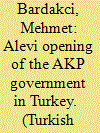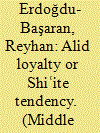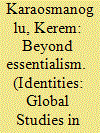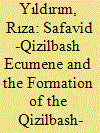|
|
|
Sort Order |
|
|
|
Items / Page
|
|
|
|
|
|
|
| Srl | Item |
| 1 |
ID:
140702


|
|
|
|
|
| Summary/Abstract |
In spite of the favorable climate created with the launch of the Alevi Initiative, which aimed at the settlement of the grievances held by the Alevi community, the Adalet ve Kalkınma Partisi (AKP) government's over-cautious approach not to offend the Sunni-Hanefi segments of the electorate has cost them the trust of the Alevi community. Besides, the weak EU political conditionality and the embedded nature of the Sunni-Hanefi interpretation of Islam in both the state and society, not to mention in the legislation, have deterred the AKP government from achieving a fully fledged settlement to the Alevi issue.
|
|
|
|
|
|
|
|
|
|
|
|
|
|
|
|
| 2 |
ID:
183371


|
|
|
|
|
| Summary/Abstract |
This article compares and contrasts the shared and unshared functions of the Shiʿite elements within three separate but interconnected Buyruk texts. While introducing Shiʿite themes like the glorification of ʿAli and ahl al-bayt, the doctrine of the Imamate, and the matter of the 14 Impeccables applied in the Buyruks, with a comparative approach, this research will unpack the differences of their application in the Buyruks versus how they are perceived in the mainstream Shiʿite. This article will then draw attention to the fact that some of the fundamental Shiʿite doctrines are not acknowledged in the Buyruks including the belief in ʾismah, the concept of khalifa, the doctrine of tabarra and the notion of ghayba. In doing so, the following questions will guide this research: how do the Buyruks speak of Shiʿite motifs? Do those seemingly Shiʿite themes involved in the Buyruks lead Alevism to be labelled as Shiʿite and, if so, in what sense?
|
|
|
|
|
|
|
|
|
|
|
|
|
|
|
|
| 3 |
ID:
123924


|
|
|
|
|
| Publication |
2013.
|
| Summary/Abstract |
In Turkey, the Alevi cultural 'revival' of the 1990s has been followed by a multifaceted identity-formation process that involves conflicting religio-cultural agendas, intersecting discourses and differing politico-ideological affiliations. Lacking a focus, this process continues to trigger an enriching public debate on Alevi identity, which has been coined an 'enigma' and is considered to be associated with 'ambiguity' and 'ambivalence' by many. What lies beneath the veil of ambiguity has to do with the 'anti-essentialist' transformation of Alevism, which reaches beyond religious, cultural and political orthodoxies. As a result of diverse political loyalties, contestation of discourses on Alevi culture and identity and the equivocal character of the Alevi subject, the Alevis seem to be resisting essentialism. In urban Turkey, an anti-essentialist discourse potentially influencing Alevism, I argue, enables the Alevi self to act with a sense of reflexivity and to search for ways to avoid political, cultural or religious orthodoxies.
|
|
|
|
|
|
|
|
|
|
|
|
|
|
|
|
| 4 |
ID:
168974


|
|
|
|
|
| Summary/Abstract |
Alevis, the largest religious minority of Turkey, also living in Europe and the Balkans, are distinguished from both Sunnis and Shiʿites by their latitudinarian attitude toward Islamic Law. Conceptualizing this feature as “heterodoxy,” earlier Turkish scholarship sought the roots of Alevi religiosity in Turkish traditions which traced back to Central Asia, on the one hand, and in medieval Anatolian Sufi orders such as the Yasawi, Bektashi, Qalandari, and Wafaʾi, on the other. A new line of scholarship has critiqued the earlier conceptualization of Alevis as “heterodox” as well as the assumption of Central Asian connections. In the meantime, the new scholarship too has focused on medieval Anatolian Sufi orders, especially the Bektashi and Wafaʾi, as the fountainhead of Alevi tradition. Critically engaging with both scholarships, this paper argues that it was the Safavid-Qizilbash movement in Anatolia, Azerbaijan, and Iran rather than medieval Sufi orders, that gave birth to Alevi religiosity.
|
|
|
|
|
|
|
|
|
|
|
|
|
|
|
|
|
|
|
|
|